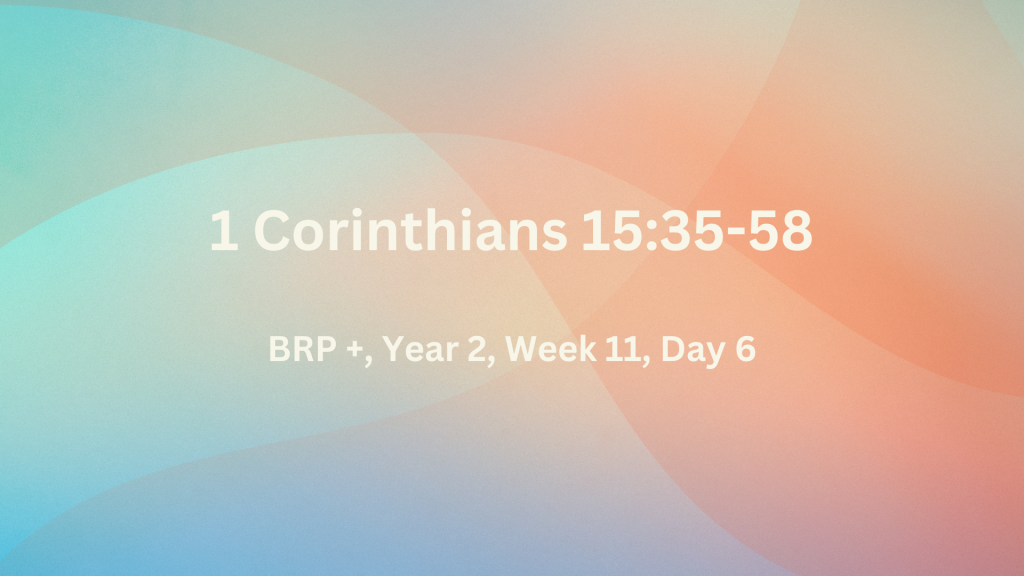1 Corinthians 15:35-58
Q.1. What common question about the afterlife did Paul address? How do the heavens and earth declare the principle of resurrection? How does this apply to fallen humanity? – (1 Cor.15:35-44)
The Bible does not avoid the difficult questions about life and death. How grateful we should be that Paul discussed – … How the dead are raised, and with what kind of body they come? (1 Cor.15:35). Paul asserted that the confusion arises because people do not stop to consider the natural order all around them. He pointed out – 36 …That which you sow does not come to life unless it dies; 37 and that which you sow, you do not sow the body, which is to be, but a bare grain, perhaps of wheat or of something else (1 Cor.15:36-37). He claimed that God has built the principle of resurrection into all of creation, from animal and plant life, all the way to the heavenly bodies (see 1 Cor.15:38-41). The body that is planted and dies, is vastly different from the body that follows, in both substance and glory, and – God gives it a body just as He wished, and to each of the seeds a body of its own (see 1 Cor.15:38).
Q.2. What point was Paul making about the first and last Adam, and the first and second man? How are we connected to these two types? Why is it vital to be in Christ? – (1 Cor.15:42-50)
We all come from Adam and are therefore under the same curse of death as Adam and Eve. Paul teaches that we are natural and perishable … sown in dishonour and weakness. However, for those related to the last Adam, Jesus Christ, we will be raised with a spiritual body that is imperishable … raised in glory and power (see 1 Cor.15:42-44). Paul shared the thrilling truth on which our hope is built, that – …The first man, Adam, became a living soul. The last Adam became a life-giving spirit (1 Cor.15:45). There is a divine order (see 1 Cor.15:20-23), in which the natural gives way to the spiritual (see 1 Cor.15:46-49). Paul confidently reminded believers – Just as we have borne the image of the earthy, we will also bear the image of the heavenly (1 Cor.15:49). However, it is a fact – … that flesh and blood cannot inherit the kingdom of God; nor does the perishable inherit the imperishable (1 Cor.15:50). That is why Jesus told the learned rabbi Nicodemus – You must be born again (Jn.3:3 &5).
Q.3. Is death the end of all hope? Will everyone die before the resurrection? How complete is God’s plan of salvation? Through Whom does this victory come? What difference should this make? – (1 Cor.15:50-58)
Paul unveiled the mystery of the resurrection, and the rapture of all believers, both the living and the dead. This is in line with his teaching to the Thessalonian Church – 51 Behold, I tell you a mystery; we will not all sleep, but we will all be changed, 52 in a moment, in the twinkling of an eye, at the last trumpet; for the trumpet will sound, and the dead will be raised imperishable, and we will be changed (1 Cor.15:51-52 c.f. 1 Thes.4:13-17). The bodies of all believers will then be changed into imperishable and immortal bodies, as – Death is swallowed up in victory (1 Cor.15:54). Death’s curse will be forever banished for believers (see 1 Cor.15:55-56). With the apostle we proclaim – thanks be to God, who gives us the victory through our Lord Jesus Christ (1 Cor.15:57). Until that day, the foundation has been laid, so that we can faithfully serve the Saviour and – be steadfast, immovable, always abounding in the work of the Lord, knowing that your toil is not in vain in the Lord (1 Cor.15:58).

